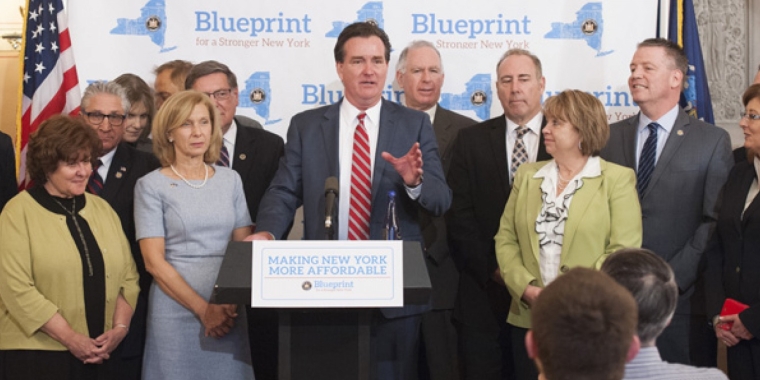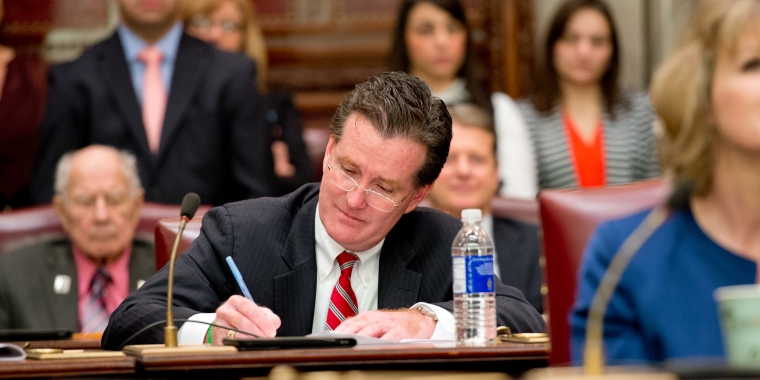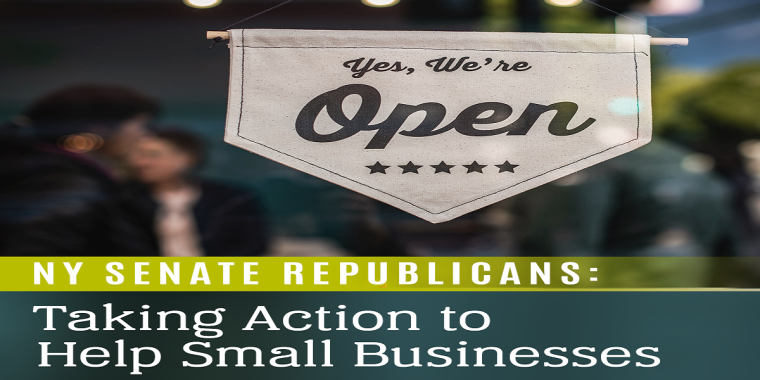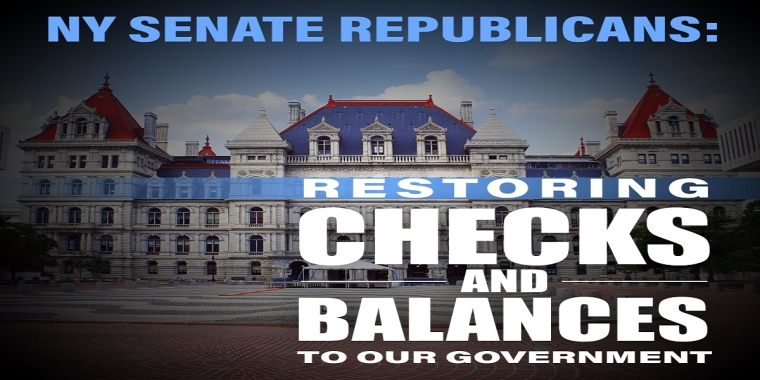
Senate Passes New Measures To Cut Taxes And Generate More Opportunity For New York Business
June 20, 2018

The New York State Senate has passed several bills to promote opportunity and cut taxes for businesses and not-for-profits throughout the state. The measures continue the Senate’s efforts to prevent unintended tax increases as a result of the Federal Tax Cuts and Jobs Act of 2017; correct a state law to avoid a tax increase that would be debilitating for not-for-profits; expand the state’s corporate franchise zero percent tax rate to all manufacturers located in the state; and reform small business regulations.
Senate Majority Leader John J. Flanagan (2nd Senate District) said, “New York State routinely ranks as one of the worst states in the country for business. That is why our Republican Majority has been leading the charge to protect New York taxpayers and businesses from unintended negative consequences of the federal tax changes. These bills are an important step in making our state more affordable for residents and businesses and improving our business environment to attract new investments in our workforce to ensure that New York State is finally truly open for business.”
The measures build on the Senate Majority’s Jobs and Opportunity Agenda, part of the three-pronged “Blueprint for a Stronger New York” that focuses on making the state less costly and more attractive for hardworking New Yorkers. When combined together, the Blueprint’s Affordability, Opportunity, and Security Agendas comprise a powerful and comprehensive plan to give all New Yorkers the opportunity to succeed.
Protecting New York Businesses from Federal Tax Changes:
In response to the Federal Tax Cuts and Jobs Act of 2017, the Senate passed several pieces of legislation to protect New York businesses, corporations, and not-for-profits from unintended tax increases. These measures maintain the tax treatment of these entities that was in effect prior to last year’s major federal tax overhaul. These bills are consistent with actions taken throughout the Legislative session and during the passage of the 2019 Enacted Budget to prevent the state from receiving windfalls as a result of the Federal tax changes, which were first proposed by the Senate. Legislation includes:
S9029, co-sponsored by Senators Elaine Phillips (7th Senate District) and Chris Jacobs (60th Senate District), prevents an unintended state corporate tax increase on financial institutions as a result of the loss of Federal Deposit Insurance Corporation (FDIC) premium deductions. This bill maintains treatment of FDIC premiums by allowing New York taxpayers to continue to deduct.
Senator Phillips, Chair of the Senate Committee on Banks said, “With financial institutions in New York, especially on Long Island, already paying extremely high taxes, the inability to deduct Federal Deposit Insurance Corporation premiums could be crushing. This measure would prevent an unintended state and corporate tax increase, which would have occurred due to the federal tax change, and will ease the burden for hardworking taxpayers.”
Senator Jacobs, Chair of the Senate Committee on Consumer Protection, said, “Revitalizing the economy in Western New York and across our entire state remains a top priority, and improving our business climate is critically important to achieving that goal. Passing this bill enables us to decouple state tax law from recently enacted federal changes, keeping in place tax deductions that make New York State more competitive and business friendly.”
S8831, sponsored by Senator Michael Ranzenhofer (61st Senate District) and which has already passed the Assembly, corrects an unintended new tax on not-for-profits. A recent change made in the Federal Internal Revenue Code provides for an unrelated business tax (UBIT) on any amount a not-for-profit employer has paid for commuter benefits such as mass transit or parking fees. Current state law imposes a state tax of 9 percent on UBIT whenever federal law does. As a result, without this important legislation, New York will automatically impose an additional 9 percent tax on all not-for-profits which would divert millions of dollars away from the not-for-profit sector each year. This bill excludes payments for transportation costs to ensure that not-for-profits can continue to perform their mission and serve New Yorkers across the state.
Senator Ranzenhofer said, “It is extremely important that we make this correction and protect our not-for-profit institutions from a significant tax increase. Not-for-profits provide critical services to the communities they serve and this bill will help ensure that their limited resources are spent in the most effective and helpful way possible.”
S8991A, sponsored by Senator Flanagan, prevents an unintentional tax increase on the financial services industry – one of New York’s largest industries. Under the new federal tax law, a change was made in an effort to repatriate foreign held intangible assets such as patents, copyrights, and trademarks. However, a technical change led to other types of intangible income such as financial transactions to be included, which eliminated the state exemption for foreign financial transactions. This bill preserves the state’s treatment of controlled foreign corporation (CFC) income that has been in place for decades.
S9052, sponsored by Senator Flanagan, prevents an unintentional tax increase on partnerships. Under the new federal tax law, changes were made to tax earnings of foreign companies that are owned, either directly or indirectly, by U.S. taxpayers. The creation of a transition tax to repatriate those funds has a negative impact on partners, especially in large accounting firms, because it would subject their share of the partnership to state taxation prior to receiving the income. This bill decouples partnerships from the federal transition tax and preserves the state’s treatment of partnerships by ensuring that income will not be subject to state taxation until it is received by the partner.
S9030A, sponsored by Senator Tom O’Mara (58th Senate District), prevents an unintended new tax of businesses as a result of the loss of deductions of business interest expenses. Under the new federal tax law, deductions were capped at 30 percent of business interest expenses in exchange for a five year period where businesses could expense capital investments. While New York is already decoupled from federal bonus depreciation, this legislation ensures that New York’s businesses are not subject to a higher state tax liability as a result of the interest deduction cap.
Other Measures to Improve the Business Environment of New York:
Making New York More Manufacturer-Friendly
S7561A, sponsored by Senator O’Mara extends the corporate franchise zero percent tax rate to all manufacturers located in the state. When zero percent corporate franchise tax rate was first introduced in 2014 it only applied to manufacturers organized as C corporations, about 25 percent of all manufacturers. This left the remaining manufacturers to pay the higher rate and put them at a competitive disadvantage with manufacturers in states with no income tax. New York is currently ranked 49th as a manufacturing friendly state, but this new legislation could boost it to one of the top-ranked states in the nation and attract new manufacturers to invest in the state’s workforce. According to a recent study by the Beacon Hill Institute, an extension of the zero percent tax rate to all manufacturers, regardless of structure, would result in an increase in private sector jobs and a boost in economic activity and local tax collection to offset the loss of revenue to the state.
Senator O’Mara said, “A foundation of manufacturing is critical to the short- and long-term strength of the regional, statewide, and national economies. We need to keep taking tax relief, regulatory reform, and other actions at every level of government to do what we can to ensure a business climate that helps our manufacturers expand, thrive, and create more good jobs for local workers.”
Authorizing Small Business Savings Accounts to Help in Emergencies
S3557, sponsored by Senator Phil Boyle (4th Senate District), helps create or retain jobs during times of hardship by allowing small businesses to contribute to a tax-deferred savings account. Contributions to the account could be withdrawn tax-free during times of specified economic hardship, for the purpose of job retention or creation, or times where the Governor deems it a natural disaster to warrant assistance from the federal government.
Reducing Regulatory Fines on Small Businesses
S4120B, sponsored by Senator Fred Akshar (52nd Senate District) and which has already passed the Assembly, gives first-time offenders of state small business regulations a reprieve from paying fines to help foster a productive relationship between the state and business owners. The measure would prevent the state from fining a small business for a first violation of regulations, unless the agency determines that the violation directly affects public health or safety. The agency then would provide literature or an in-person meeting to inform such small business of its regulations to improve compliance.
Giving More Time to Provide Input on Proposed Regulations:
S6916, sponsored by Senator Jacobs and which has already passed the Assembly, amends the State Administrative Procedure Act to increase the revised rule public comment period from 30 days to 45 days. This will give businesses, other interested parties and the public more time to review substantial changes to regulations that are proposed by state agencies and provide input when necessary.
The bills have been sent to the Assembly, with the exception of S4120B, S8831, and S6916, which have passed the Assembly and will be sent to the Governor for review.



